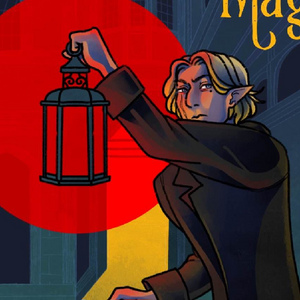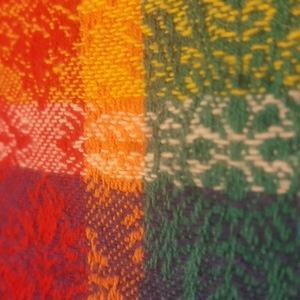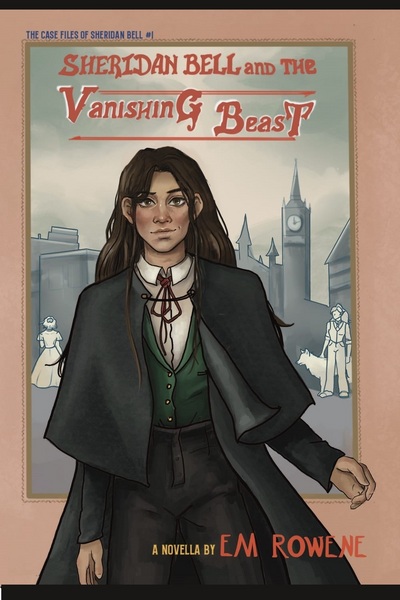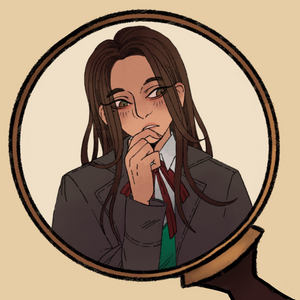Henry paced back and forth in front of fog bleak windows, exhausted yet bursting with energy. He had an audience: Alice and the Amaikes, seated around the dining table, plates piled high with breakfast foods and mildly concerned looks in their eyes. Henry had burst into the Amaikes’ flat with the tolling of the morning bell, dark bags under his eyes and a stack of heavily bookmarked tomes in his arms. While he paced, he flipped through the oldest of them, his hair falling into his face and his brows furrowed in thought.
“Aha! Here it is. I was up all night reading, following a hunch,” he explained, holding his book up so his friends could see the title: ó Dubhghaill’s Compendium of Intelligent Magical Beasts. “Joseph, Ines, how much has Alice told you about yesterday’s adventures?”
“Enough to get a sense of the situation,” Joseph said.
Henry nodded impatiently, eager to get on to his discoveries. “Yes, good. In summary: dog broke into home, man was killed by dog, and dog vanished, apparently into the aether. We don’t know how the dog got inside, but we know it was strong enough to crush Hathaway’s windpipe — er, sorry, Alice — and that it must have been sídhe, as non-magical threats would have been stopped by Alice’s wards. At first, I thought we might be seeking someone who can change forms, but that theory doesn’t account for certain details. All the clues taken together, I decided to research sídhe fauna.”
“No offense,” Alice said, “But I don’t think some animal could’ve broken through my wards.”
Henry tapped the cover of his book. “Intelligent Magical Beasts, Alice. Any creature in here would be clever enough to outsmart or strong enough to overpower your wards in an instant. Take, for instance, this one.” Without further preamble, he dropped the open book onto the table between a bowl of eggs and a plate of toast. A carefully-inked hound glared up at them all from between the pages, its eyes blank and its teeth bared into a vicious snarl.
Joseph sat forward to read the caption. “The cú sídhe…?”
At that, Alice gasped, and when everyone turned to look at her, shook her head. “The cú sídhe are a folk tale. That’s all.”
“I thought so too, at first, but there are too many stories about them, all told too far apart. That’s never a coincidence,” Henry said. He glanced briefly at Alice, then frowned and looked again. The girl, who had been wearing a plain dress and school jacket the day before, now wore a bright, girlish frock. “You didn’t go home last night to change, did you?”
Alice tugged self-consciously at the lace. “No. Ms. Ines gave this to me.”
“You left her here in a sopping wet dress, Henry,” Ines scolded. “Fortunately, Renna’s old clothes fit her perfectly.”
“Urenna’s style really hasn’t changed over the years, then,” Henry said, instantly regretting it. He retrieved his book from the table. “It looks very nice, Alice.”
“You know their daughter?” Alice asked.
Henry cleared his throat, cheeks tinged a faint pink. “Getting back to the cú sídhe: in the old stories, they roamed the moors, occasionally crossing to our world — most often on holy nights — to hunt. Their howls foretell death and they can find their prey at any distance, et cetera, et cetera,” he said, picking up another book and leafing through it.
Joseph shifted uncomfortably in his seat. “Is that something to be so glib about, Henry?”
“Half the creatures in that compendium have the same gloomy stories, Joseph. If you read enough of them, they grow tiresome. What’s far more interesting are the kernels of truth hidden behind the myth, the details you see come up again and again in stories from across the continent, across decades or even centuries: that the cú sídhe take the form of large dogs, that they have the power to weave between worlds, that their skill in the hunt is unparalleled.”
“But why would they kill Arthur Hathaway?” Joseph asked. “If these beasts are running around assaulting respectable gentlemen in their own homes, surely someone would have—”
“These are no common wild beasts, Joseph, nor was the attack on Hathaway random,” Henry interrupted. “The cú sídhe take orders from their masters.”
“Come, Henry, I know you like to save your secrets until the case is solved, but you shouldn’t tease like this,” Ines said.
Henry smiled, amused. “Very well, then. I found some old accounts that suggest the cú sídhe are connected to a family here in Tamarley. One of the oldest families in Tamarley, in fact: the Uí Anghau.”
Again, Alice gasped.
“Oh?” Henry asked, raising an eyebrow at her when she didn’t say anything more. “You don’t believe in the cú sídhe, but you believe in the Uí Anghau?”
“Of course I believe in the Uí Anghau! The Uí Anghau are real!” Alice snapped. “My parents knew someone who made a deal with them.”
“Now you’re both being secretive,” Ines said, crossing her arms. “Who are the Uí Anghau? Why haven’t I ever heard of them?”
“Because they prefer it that way,” Henry said with a shrug, answering the second question first. “From what I can tell, the Uí Anghau keep to themselves. They stay mostly out of the papers, and when they do appear, they’re alluded to but never openly discussed. The further back you go, the more stories you can find about them, but those are about as dramatized as the cú sídhe’s. They say—”
“The Uí Anghau are deal makers,” Alice interrupted. She glanced at the front door, as if wary the cú sídhe might break it down at any moment. “They’ll give you anything you want, grant any wish, but only at the cost of your soul.”
“Yes, that,” Henry said, unimpressed. “So the stories go, if you make a deal with the Uí Anghau, you can expect them to send the cú sídhe after you when it comes time to collect. And there is no escaping the cú sídhe.”
“They’re bad news,” Alice said. “They say the Lord of the House Anghau made a deal with death and won.”
Henry rolled his eyes. “You can’t win deals, Alice. The definition of the word implies an exchange. And from what I can tell, they’re not half so frightening as that. They run a respectable business in Upper Tamarley, nowadays. I’m only going to ask them a few questions.”
“Saoirse says they’re not to be messed with.”
“Saoirse’s right, and you’d best listen to her,” Henry said. He gathered up his books. “Now, if you’ll excuse me, I’m off to interrogate their leader.”
“Henry!” Ines exclaimed.
“How are you even so certain the Uí Anghau are involved?” Joseph asked.
“I’m never certain about anything, Joseph. It’s possible they aren’t — it’s possible they have no connection to the cú sídhe, or that the cú sídhe aren’t involved at all. But I have a theory, and if you don’t mind, I’ll keep this one secret until I’m either proven right or wrong.”
“I don’t like this, Henry. Take your sword with you, if you must go,” Ines said.
“That would be asking for trouble,” Henry said. “Absolutely not.”
“Then take Inspector Zhou?” Joseph suggested.
Henry shook his head. “He doesn’t know about my weaving, and I would prefer that he didn’t find out. If my theory is correct, we only have until tonight to solve this, so I’m certainly not about to waste time going through customs with the dear Inspector.”
“What happens tonight?”
Henry tugges his coat on impatiently and threw the door open. "The beast strikes again."












Comments (1)
See all